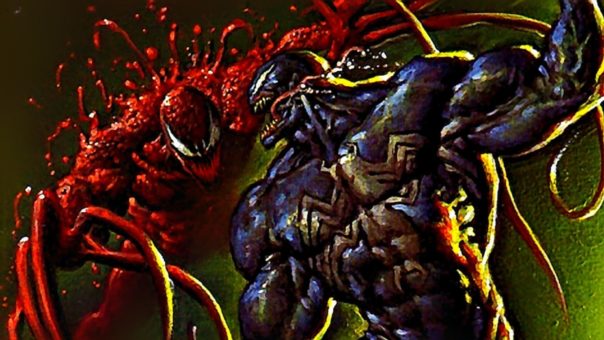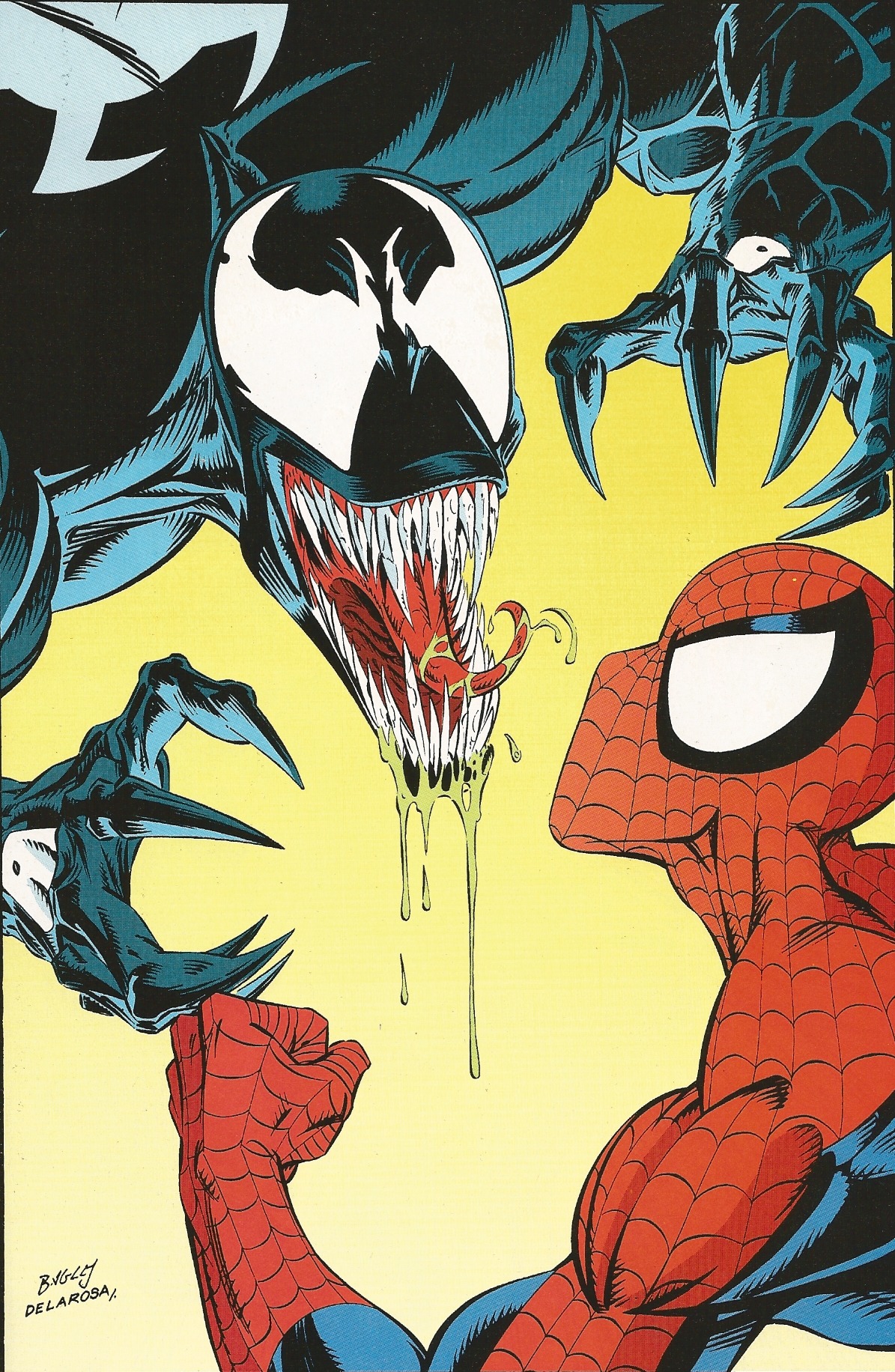Are the two most criticized Spidey villains really all that bad?

Ever since Venom’s debut in 1988 he’s had haters and they only grew when the 1990s rolled round. Similarly, 1990s creation Carnage has had his detractors almost since day one and collectively there is a vocal contingent of Spider-Fans who loathe both characters.
Which is fine.
Personal taste is individual so not everyone is going to like the same thing.
Where we should raise questions though is when these detractors (in not so many words) simply broad-brush declare the characters as bad. ‘They suck’. ‘They are spare villains’. ‘They’re garbage’.
Whatever words or phrases they use it boils down to the same argument.
The characters lack redeeming creative merits.
However…this is simply untrue.
Whilst certain fans might not personally enjoy the creative merits of either character it’s simply ignorant to handwave them as lacking any whatsoever.
To begin with both characters have simply stunningly dynamic and memorable visuals.


Both characters have highly creative and versatile powers.


Oh, and they’re seriously dangerous, a rather appropriate and important quality in most supervillains.


When written well (such as in his first two stories) Venom can be most assuredly a deep character.
I’ve written about this before, but Venom’s deeper substance as a villain stems from his early characterizations as a creepy stalker and near unstoppable force for Spider-Man. He was one of the few foes who could invade Peter’s privacy and to whom Peter posed no real threat to the point where Spidey himself was actively afraid of Venom.
Moreover Venom functions as an exquisite dark reflection of our hero, typified by his refusal to accept responsibility for his actions.
Whilst they alter aspects about the character (more specifically Eddie Brock) adaptations of Spider-Man featuring Venom (such as the 1994 animated series and 2008 Spectacular cartoon) bring out many of these elements to the character and similarly showcase him as a force to be reckoned with. This is in no small part due to his knowledge of Peter’s identity, having better spider powers than him and existing for nothing beyond Spidey’s absolute eradication.
And speaking of his drive to eradicate Spider-Man, at least half of that is an imagined slight stemming from the mind of a delusional individual incapable of accepting responsibility for their own failings. This is something starkly realistic that also ties strongly into the theme of responsibility. In other words something that cuts close to concepts that define the essence of Spider-Man.
The other half of it is essentially a ‘lover scorned’, a desire for reciprocated affection that has turned to violent hatred over rejection.
This something realistic that is also incredibly emotional at its centre, again a concept indicative of Spider-Man’s mythology.
So there is actually a respectable amount of meat to Venom’s character.
The problem he has suffered is that he became so popular it prompted Marvel to have him show up more and more, thus his impact became lessened as he became worn out and overexposed.
This doesn’t make Venom inherently bad as overexposure can happen to any character (my God…Wolverine…or Spider-Gwen even…). However, it is an especially a big problem with villains since villains (unlike heroes) tend not to be built to be protagonists. Consequently they cannot weather repeat appearances too much if not handled with care. In particular Venom’s concept (and appeal) as a villain was worn out quickly due to essentially annual appearances.
The character had a singular motivation and his appearances boiled down to essentially the same thing over and over again.
Which would have been fine had he appeared with moderation, say once every five years for example. But once per year was unsustainable and possibly part of the reason his divisive anti-heroic tendencies (which objectively compromised his standing as a villain) began to creep in. Similarly when it came time to spin the character off totally re-orientating the character around to being an anti-hero made a certain amount of practical sense as someone dedicated to just killing Spider-Man would never have worked as an ongoing protagonist.
The problem being that for many people that characetrization was in and of itself problematic. Even putting that aside, repeatedly showing off Venom every month further overexposed a character not built to have the kind of substance to sustain that kind of longevity.
It is telling that the most critically successful iteration of Venom as an ongoing protagonist was when his host was Flash Thompson, an entirely different character from Eddie Brock in every respect and one who themselves had decades of history and development behind them.
1990s Venom overexposure was not helped by the character getting a new issue #1 as frequently as he did which led to more promotion for the character.
Poor Venom was watered down, changed and derailed as a character so Marvel could exploit him. For many fans he’s simply never truly recovered from that. For the record I am not one of those fans as I think the late 1990s and early 2000s did much to fix the character only for other stories to derail him again.
But the negative reputation of the character has dogged him and so it has led in my view to many fans simply projecting problems onto the character overall that either do not exist or else do exist but not in literally every appearance of the character. There is for instance little wrong with Venom in his second ever appearance, quite possibly his best one to date. People just do not give the character a chance, do not contextualize things properly or walk into his stories having already decided to hate on him.
Which frankly are markers of poor critics and analysts.
Carnage has similar overexposure problems but, like Venom, was also not without his merits
Fundamentally Carnage was supposed to be more a force of nature than a person. He was death and chaos incarnate, so much so that the original name for the character was supposed to literally be ‘Chaos’. Personally I think ‘Carnage’ worked much better.
He was kind of Venom turned up to 11. Whilst Venom existed to kill Spider-Man but had a warped moral code which meant he wasn’t going to hurt anyone else (unless he you got in his way) Carnage simply lacked any empathy. He killed because he saw the boundaries of human society as fabricated and people’s adherence and reverence of them as a joke.


And appreciating this he thus indulged his most violent primal urges and murdered practically indiscriminately because he could and more importantly because he liked it.

He was in many ways unchained insanity, pure original recipe evil. A smart animal who could not be reasoned with or had a personality flaw that could be grossly exploited in order to defeat him.
Whilst Spidey could use Doc Ock’s ego, Rhino’s blunt stupidity, Norman’s loathing of himself and Venom’s warped morality to his advantage, with Carnage he had no such luck. Carnage was simple and for the most part a one track mind.
He just wanted to murder, maim and spread chaos and his power to transform his hands and whole body into a variety of lethal weapons meant he could do it in creative ways.
This presented a very different challenge for Spider-Man. He wasn’t really a man with a plan. He lacked any desires for wealth of power let alone someone who desired to attack him personally.
He just wanted to watch the world burn and have fun while doing it.
This simplicity was part of Carnage’s charm.
He was fun for a lot of people precisely due to raw simplicity (he just wanted to kill for its own sake), his over the top nature, the mayhem and destruction he could unleash, his rocker anarchist mentality and his Joker/Freddy Krueger-esque style of threatening humour. Plus those striking visuals and creative powers I mentioned above were just fun for many readers.
I can respect and understand all that not being to everyone’s tastes. Like I said, personal taste is individual.
But I am calling out everyone who dismisses the character as objectively bad simply because he is those things, as though those aspects are somehow themselves without appeal or merit.
As I said Carnage was reminiscent of Freddy Krueger and the Joker (the latter being one of the inspirations for him, although he isn’t really a rip-off as people have claimed) and in his powers incredibly reminiscent of the T-1000 from Terminator 2: Judgement Day. A.k.a unquestionably the single most influential action movie of the 1990s.
Those characters all had huge followings and were all in their own ways praised and well received.
Carnage in having traits of such characters obviously carries similar appeal and merits.
But if you just hate those traits in the first place it’s understandable as to why you’d hate Carnage. But again, personal distaste does not equal objectively bad. To think so is to be either painfully elitist and/or achingly old fashioned.
And within Spider-Man fandom that last one really is disingenuous given how the vast majority of his villains up until the early 1990s (and for some even to this day) were similarly one note.
The Sandman spent in excess of a decade as a thug with sand powers until he began developing in a story with Ben Grimm of all people, not even in Spider-Man himself.
The first hint in a Spidey story of the Rhino being more than a talking tank came in Spectacular Spider-Man #190 (after Carnage debuted by the way) and he barely developed in any noteworthy way afterwards until around 2009.
The Shocker still hasn’t seriously developed despite being a fan favourite B or C list villain.
Even Doctor Octopus did not really have a truly emotionally engaging or compelling motivation to his character until Spider-Man Unlimited #3 in 1993…which was also after Carnage debuted.
The harsh truth is most of Spider-Man’s villains were and to an extent still are visually dynamic characters with fun gimmicks.
Carnage was no different beyond some fans cynically hand waving his gimmick as somehow worse than the guy who wore a fishbowl and kept trying trick Spider-Man’s perceptions for the umpteenth time.
To repeat myself (because I can never say this enough), it’s cool if you do not personally like a certain gimmick. But that’s different to the gimmick actually being bad. Hence I can respect Mysterio as a character and his fans whilst usually finding the character incredibly lame.
I mean in absolute seriousness why is a serial killer who is a play upon (an adult’s perception of) 1990s heavy/death metal anti-establishment anarchism somehow less believable and less worthy of merit than a character who literally believed themselves the most powerful human ever after an accident gave him brain damage and metal tentacles?
It’s especially two-faced to slam that as an unacceptably simplistic motivation for a villain when it was incredibly similar to motivation of the villain of a critically acclaimed film that won the actor of said movie an Oscar. You might have heard of it, it’s called ‘The Dark Knight’.
Let’s be clear I am not calling the Joker (or Ledger’s interpretation of him) as bad, as one note or as simple a character as Carnage. Though their motivations might be similar they characters embellish upon them in distinct ways that (at least from where I am standing) lends Ledger’s Joker more meat than comic book Carnage.
My point is that in the context of the time and even nowdays there is most definitely a place for villains in serialized super hero fiction who’s motivations and layers (or lack thereof) amount to what Carnage’s did. And that includes how he revels in being EXTREME!!!11!!!!
For many readers, that is just plain fun and whilst it maybe wasn’ta great idea to take certain established characters in that direction, for an original 1990s creation like Carnage why was it somehow wrong for him to embody the times? After all the iconic Fantastic Four embodied their time of origin so perfectly many writers and readers have struggled to re-contextualize them in later decades despite their early stories being possibly the best batch of comics the decade (or maybe any decade) had to offer.
Back to Carnage though, there are a few ways he does offer some potential substance as a foe for Spidey.
You could say he presents an appropriate foil for Spider-Man since he is driven by the innate desire to take and destroy life. It is what he lives to do and his powers (stemming from his costume) facilitate him doing that on a larger scale. Peter by contrast uses his ‘costume’ to act as a fundamentally life preserving force in the world.
Alternatively, to get very wishy-washy, you could argue the chaos and disorder Carnage represents reflects the disorder and chaos of Peter’s own life from trying to balance his responsibilities
This all being said, like Venom, Carnage was a decent enough villain simply overexposed; a problem still arguably plaguing him to date.
He was a force of nature. A one note villain who could wonderfully play that note for what it was. A simple character, but an effective one for the role he was intended for.
But the problem with characters as inherently simple and lacking in layers and nuance as Carnage was is…you can’t use them all that often.
There is simply very little to do with characters like that because it will boil down to more or less the same thing over and over again. Yes ‘Maximum Carnage’ offers different elements from Carnage’s debut but on a certain fundamental level it’s still Carnage going on a killing spree forcing Spider-Man to team up with allies like Venom to end his threat.
I suspect this repetitiveness is the reason why in just a few years we got stories about the Carnage symbiote bonded to other characters like Ben Reilly and the Silver Surfer. Those stories offered something significantly different beyond Carnage on a killing spree again. But noticeably both stories unto themselves held similarities in so far as a noble and heroic person becomes possessed by Carnage and is now at risk of indulging in incredibly violent and destructive urges that they painfully must fight against. Though both stories are different enough, the Surfer story followed on from the Ben Reilly one, proving my point about Carnage’s simplicity and overexposure.
His simplicity is also why I believe Conway’s acclaimed Carnage series managed to work, because it flipped the script and treated Carnage as a horror monster, making the book about the humans fighting against Carnage rather than Carnage himself as the true protagonist. It also helped that he wasn’t being pitted against Spider-Man for the umpteenth time.
Now many people might enjoy seeing the same types of stories for Carnage repeatedly but seeing them too often as we did (especially in the 1990s) became a huge problem.
Carnage is over the top, extreme, ‘taken up to 11’, whatever you want to call it. And it is because of that fact that Carnage (even more than Venom) required moderation.
But alas, the 1990s being what they were quantity was the name of the game and so we were treated to…the longest Spider-Man story of all time; no not the Clone Saga, that was an era not a story. I am of course referring to ‘Maximum Carnage’. Everything about this story encapsulates everything that shouldn’t have happened to Venom or Carnage.
Both characters in stories like this were mined hollow but that’s not their fault. They just need writers who both understand them and know that with these guys, less is more.
And we can even prove this when we take a look at some of the good Venom and Carnage stories out there. Such as:
‘Undone’ (Spider-Man Family Volume 2 #2)

‘Carnage: Mind Bomb’ and ‘Carnage: It’s a Wonderful Life’.


‘The Mortal Past’ (Amazing Spider-Man Annual 1995). Which was excellently spotlighted in Crawlspace’s ‘Overlooked Gems’ segment.

‘The Return of Venom’ (Amazing Spider-Man #316-318)

And yes…even the very first evil symbiote story…’Venom’ (Amazing Spider-Man #300)

With some rehab and sensible thinking both of these characters can have great stories like the above again.









